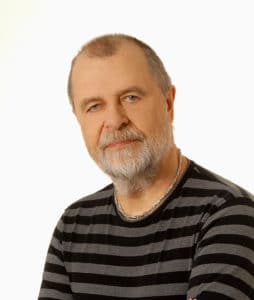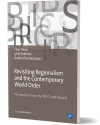Revisiting Regionalism and the Contemporary World Order. Perspectives from the BRICS and beyond analyzes the ongoing changes in the dynamics of cooperation from a multi-disciplinary and pluralist perspective. The book is based on the insight that in a post-hegemonic world the formation of regions and the process of globalization can be disconnected from the US, and that a plurality of power and worldviews has replaced US hegemony. The book proposes to advance a truly global IR understanding of the post-hegemonic world, and weaves together the pluralist and multi-disciplinary perspectives of scholars.
Revisiting Regionalism and the Contemporary World Order is edited by Élise Féron, Jyrki Käkönen and Gabriel Rached. We appreciate that Jyrki Käkönen representatively took the time to reply to our 5 questions.
Short vita of Jyrki Käkönen in his own words:
 Jyrki Käkönen is Emeritus Professor and senior scholar in a KONE funded research project on “Regional Challenges to Multilateralism”. He was Professor in International Relations and European Studies at the Institute of Political Science and Governance in Tallinn University (2007-2015), Jean Monnet Professor in the Department of Political Science and International Relations in the University of Tampere (1998-2007). He was the director of the Department of Political Science and International Relations at the University of Tampere (2002-2007) and the director of Tampere Peace Research Institute (1988-1998). His current research interest is in the changing international order and how the transition of the system challenges Eurocentric IR approaches.
Jyrki Käkönen is Emeritus Professor and senior scholar in a KONE funded research project on “Regional Challenges to Multilateralism”. He was Professor in International Relations and European Studies at the Institute of Political Science and Governance in Tallinn University (2007-2015), Jean Monnet Professor in the Department of Political Science and International Relations in the University of Tampere (1998-2007). He was the director of the Department of Political Science and International Relations at the University of Tampere (2002-2007) and the director of Tampere Peace Research Institute (1988-1998). His current research interest is in the changing international order and how the transition of the system challenges Eurocentric IR approaches.
1) What will be the main challenge for your research field in the coming years?
In the international relations or world politics, theorization has been based on the historical experiences of the Western world as well as on Western academic knowledge. Currently some non-Western powers have taken their place among leading powers and the world is not lead by the West and by the Western values anymore. Emerging powers have a long civilizational history distinct from the West. They increasingly look at the world from their own perspective and bring in their non-Western approaches in understanding international relations and world politics.
This means that the current liberal international order as well as the discipline of international relations face a challenge. Western-centric perspective has meant that within the discipline the focus has been in great powers as well as in the East-West tension. However, much older tension – connected to colonialism and globalization – has been the North-South tension. In this context, the potential power shift as well as the disciplinary challenge can be understood as a continuation of the decolonization of the international system as well as the epistemic community.
2) Why would anyone want to pursue research in your field?
Studying international relations is interesting just now because the whole system as well as the discipline explaining and understanding it are in the flux. But it is not only that what makes international relations an interesting field of studies. An additional factor is climate change and its challenge to economy and politics in different parts of the world. Latest now we have to begin to understand the interaction of the nature and the human-made society.
3) Why did you choose your research field? What motivates you in your field in particular?
When I came into the field in the 1970s, the world faced the problem of underdevelopment, violent conflicts in the so-called Third World and the threat of a nuclear war. I thought that knowing more about the causes and consequences of those problems could help solving the problems and build a better and more peaceful world. Therefore I became a peace researcher.
Now I can say – sorry for that – that nothing has changed. Arms race continues, half of the world is still far from the Western standard of life or way of living, and in answering these questions there are about 30 violent conflicts going on, in which more than 100 people have been killed this year. In addition to those we have to face the climate change which will give us increasing amount of refugees to be taken care of.
A kind of disappointment has not changed my motivation. It is not because of the research results that nothing has changed. The problem is politics. The knowledge the research has produced is not applied in politics. In politics it is still the next elections and national interest that matters and not the global human interest.
4) Which (academic) book has influenced you the most?
At least in my case it really has not been a single book. In my own academic life in different times different books have opened my way of understanding into new directions. Often the impulse has come from outside of my own discipline. But if I have to name only one it could be a book by an almost unknown Finnish philosopher from the 19th century: Wilhelm Bolin, Europas statslif och filosofins politiska läror (= Europe’s political life and Philosophy’s political doctrines, 1870–1871).
5) This is why we are authors with Barbara Budrich:
It was smooth to work with you, and what we appreciated was the freedom you gave us in compiling the book. All the way through the process instructions were also clear, what made it easy (though it’s never really easy) to work through the process and eventually publish the book.
Published by Budrich:
 Élise Féron, Jyrki Käkönen, Gabriel Rached (eds.): Revisiting Regionalism and the Contemporary World Order. Perspectives from the BRICS and beyond
Élise Féron, Jyrki Käkönen, Gabriel Rached (eds.): Revisiting Regionalism and the Contemporary World Order. Perspectives from the BRICS and beyond

